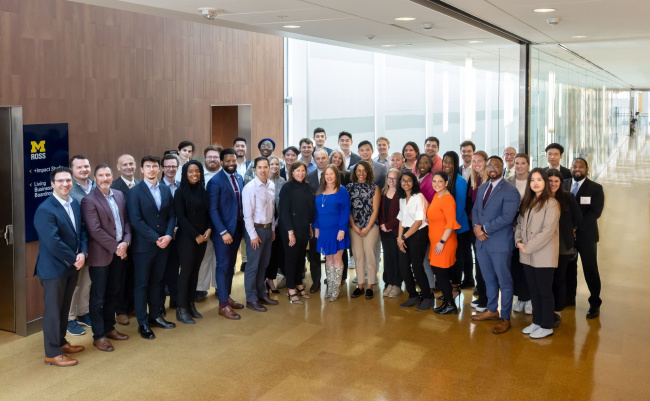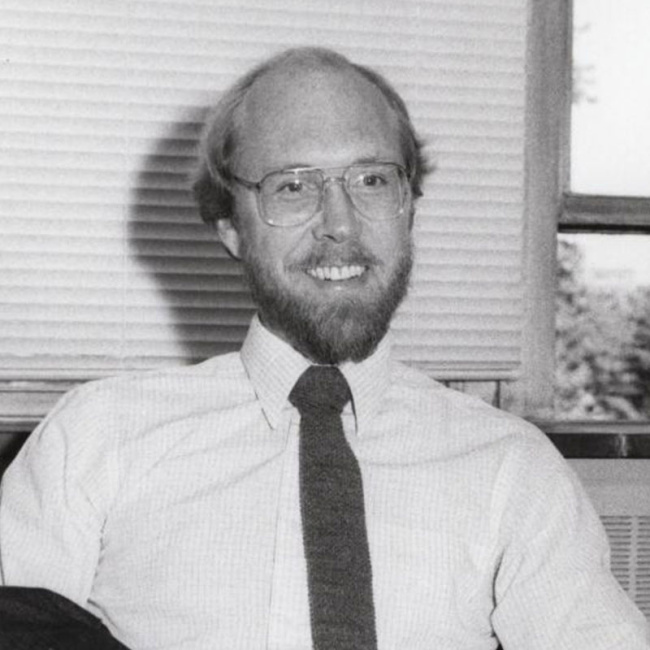Explore the faculty research, thought leadership, and groundbreaking philosophies that established Michigan Ross as one of the world’s top business schools.

Professor George Siedel was a pioneer in developing the concept of law as a source of competitive advantage. This concept originated in his 2002 book: Using the Law for Competitive Advantage. In an article in the Academy of Management Executive, Robert Thomas (past president of the Academy of Legal Studies in Business), concluded that the book "is trailblazing in its assertion that legal issues are critical strategic variables in business planning." Siedel later emphasized an international dimension to his work in his 2010 book: Proactive Law for Managers: A Hidden Source of Competitive Advantage. This work has served as a foundation for academic and practitioner interest in the design and simplification of contracts and other legal documents.

Following the decision of Dobbs v. Jackson Women's Health Organization by the U.S. Supreme Court, abortion restrictions within the United States have proliferated, and it is reasonable to expect that access to abortion services will be even further reduced in the future. The work of Associate Professor Sarah Miller investigates the impact of abortion denial using new linkages between data from the Turnaway Study and administrative records in credit reports. The Turnaway Study was a path-breaking study from the University of California San Francisco that recruited women seeking abortions, some of whom had pregnancies that just exceeded the gestational age limit of the clinic they attended and were denied abortions, others who fell just below this limit and were able to receive the abortion they sought. Miller and her co-authors found that women denied an abortion and those who received an abortion were on similar trajectories before the denial, but those denied an abortion experienced a large spike in financial problems such as unpaid bills and public records (such as bankruptcies and liens). This spike in financial problems persisted for the full six-year follow-up period that the authors had access to. The results provide evidence counter to the narrative that abortion is exclusively harmful to women who receive one (because of, for example, the regret they may feel after receiving an abortion). Instead, it suggests that giving women control over the timing of their reproduction allows them greater financial stability and self-sufficiency.

The late 1990s ushered in a revolutionary view across the social sciences centered around the power and importance of studying strengths, better understanding how people thrive, and how systems seize opportunities for creating excellence. Michigan Ross led the way in advancing this fundamental research shift in the field of management and organizations, with many scholars publishing seminal research in the field. In 2002, three faculty members, Jane Dutton, Bob Quinn, and Kim Cameron, founded the Center for Positive Organizations to encourage rigor in this growing field of research and to serve as a home for a large network of scholars interested in pursuing this line of inquiry. As the field has grown over the years, Positive Organizational Scholarship has influenced how management is taught and practiced. CPO at Michigan Ross is a leader in helping teachers and students tap into this body of evidence and learn about this research through innovative courses and developmental learning programs. Those tools include the "Reciprocity Ring", a dynamic group exercise that applies the “pay-it-forward” principle while creating high-quality connections, and the "Reflected Best Self Exercise", which helps you see who you are at your best to engage you to live and work from that powerful place daily.

In their paper, “Crowdfunding the Front Lines: An Empirical Study of Teacher-Driven School Improvement,” Professors Samantha Keppler, Jun Li, and Andrew Wu conducted the first large-scale empirical test of the frontline improvement theory in K-12 schools. The theory, originating in automotive manufacturing, states that empowering front-line employees to identify organizational and process problems and implement solutions improves organizational performance and customer satisfaction. In this case, the team of Michigan Ross professors was interested in how teacher-identified problems in the classroom and crowd-funded solutions improved learning outcomes for K-12 students.
The team analyzed data on thousands of K-12 teacher projects on the largest teacher crowdfunding site, DonorsChoose. They found that one funded project (about $400 in value), on average, achieves a significant increase in the percentage of students scoring basic and above on all tested subjects in high school, as well as science and language arts in primary and middle schools. This effect translates to two-nine additional students moving up to at least a basic level of proficiency in the correlating subject. The effect of these projects is greatest in low-income schools, where funded projects, on average, move four-10 additional students to at least a basic level of proficiency in tested subjects.
From the textual analyses of the teacher's written statements about the impact of the projects in their schools, Keppler, Li, and Wu additionally learned that student academic performance is significantly better when teachers use crowd-funded money to improve knowledge retention, as a repeated learning tool, and to differentiate or personalize learning.
Due to the demonstrated impact of teacher-driven crowdfunded projects, DonorsChoose has partnered with eight states to spend COVID-19 education relief funding on teacher crowdfunding projects. To date, these partnerships have funded over $100 million of teacher projects from over 100,000 teachers, impacting over 10 million students.

The Dare to Dream grant program is an initiative by the Zell Lurie Institute for Entrepreneurial Studies. It provides funding to U-M students interested in exploring and pursuing entrepreneurial ventures.
The student grant program offers three different tracks targeted toward early-stage students looking to develop a business concept to integrate entrepreneurship into their academic studies, students who have already developed a business concept and are seeking to validate and assess the feasibility of their idea, and students who are ready to launch their ventures.

Professor Jim Walsh was elected as the 65th president of the Academy of Management in 2006, making him only the second Michigan faculty member to lead the Academy. Walsh took stock of the approximately 16,000 members who lived in more than 100 countries at the time and noted that very few of them resided on the continent of Africa. Knowing that Africa, the cradle of civilization, is home to over a billion people and more than 1,000 universities and that the continent was poised for enormous population and economic growth, he wanted to bridge the gap and reach out to the teacher-scholars on the continent. Fully aware of the terrible history of colonization, he decided to simply create space for colleagues in Africa to meet their colleagues from the rest of the world. The first step in the process was to work with others to co-found the African Academy of Management. His continued work culminated in a 2013 AOM Africa Conference, in which approximately 300 colleagues from the world over journeyed to Johannesburg to share and imagine new research and teaching ideas. Since that time, the Africa Academy of Management has hosted a number of faculty development workshops, launched the Africa Journal of Management, and held conferences across the continent. In short, Africa-centered scholarship has burgeoned. Beyond that, the Ross School was just granted affiliate member status in the Association of African Business Schools. Professor Walsh wanted to be sure that we too are a part of the emerging scholarly conversations and evolving business practices on the continent.

In 1998, Professor David Hirshleifer of the Michigan Business School, and two co-authors, published a paper titled "Investor Psychology and Security Market Under- and Overreactions." This paper has been widely recognized as the first explanation of the seemingly contradictory behavior in asset prices (under- and overreactions to different news) based on two well documented behavioral biases. The biases outlined in the paper are overconfidence (regarding the precision of one's private information) and biased self-attribution. The former leads to well documented evidence of long-term overreaction (price reversals), while the latter causes underreaction (momentum) in the medium term. This paper was the first widely recognized paper in finance based on departures from rational behavior and provided a compelling explanation for seemingly anomalous behavior in asset prices.

Professor Paul W. McCracken was part of the Michigan Ross faculty from 1948-1986. He was a prominent economist and adviser to both Republican and Democratic presidents and was also an advocate for an active government role in economic stabilization. McCracken advocated for government policies to moderate business cycles, control inflation, and address unemployment in order to assist the disadvantaged. As a result, McCracken played a central role in addressing the rising inflation of the late 1960s and early 1970s during his tenure as an economic adviser to President Richard Nixon. McCracken criticized the government for not taking sufficient measures to combat inflation, and he supported a policy of gradualism, which aimed to slow inflation by reducing economic growth slightly without causing a recession. He proposed a combination of budget surpluses and tighter monetary policy to control inflation without severely disrupting the economy. McCracken was present during the decision to unilaterally end the Bretton Woods system, which had fixed exchange rates for major currencies. This decision resulted in far-reaching changes in the international monetary system.

As the worlds of trade and culture were globalized in the 1980s, consumers worldwide saw standardized global brands enter and grow in their local markets, displacing local brands that had been dominant for decades. But what were consumers seeing in these global brands, and why were consumers switching to them? How could local brands fight back? These timely and important questions were addressed in a series of research papers by Michigan Ross Professor Rajeev Batra and his co-authors from 1999 through 2019. They showed that if consumers perceived brands as being global, they assumed these brands were of higher quality, capable of bestowing more prestige and status to their buyers, and would bring these buyers closer to the imagined lifestyles of consumers in the home countries of these brands. These papers have been cited over 6,000 times, have been nominated for and won multiple best-paper awards in journals and societies of international marketing, and have been included in lists of the 10 papers in the last 30 years that have made the most contribution to the international marketing literature. Today, as the lure of globalization seems to be receding and local brands seem to be winning again, this work highlights the tensions and trade-offs at play.

Under the leadership of Marian Krzyzowski, Michigan Ross launched the Domestic Corps in 1992 with financial support from the United States Department of Education Fund for the Improvement of Post-Secondary Education. The Domestic Corps provided leadership development and action-based learning opportunities for Ross students while providing critical business assistance to the non-profit community in the United States. For 15 years, the Domestic Corps placed hundreds of students in more than 100 non-profit organizations nationwide, where they worked on projects in economically distressed and culturally diverse communities. That included Native American communities, inner city community-based organizations, and rural non-profits. The Domestic Corps also partnered with the University of Michigan's Neighborhood AmeriCorps Program to place MBA interns in 20 more than Detroit community-based organizations. The Domestic Corps projects helped raise millions of dollars, won national awards for community and economic development, and transformed numerous organizations while simultaneously providing students with management experience in challenging contexts and instilling a sense of corporate responsibility and social justice.

The 1996 book Competing for the Future by the late Professor C.K. Prahalad and his colleague, Gary Hamel from the London Business School, was unique in that it tied together several of Hamel and Prahalad's leading ideas into book format. The book introduces the concept of "core competencies," which emphasizes that organizations should focus on leveraging their inherent strengths and unique capabilities, and "strategic intent," which focuses on setting an ambitious, long-run vision for a firm's future. This emphasis on future thinking was a particularly notable aspect of the book. In general, the book advocated for a proactive approach to strategy where businesses actively envision and shape the trajectory of their respective industries instead of merely reacting to existing competitors and market dynamics in the short run. This emphasis on dynamics -- in particular, envisioning the future and then mobilizing strategy to compete in shaping it -- had important managerial implications for business thinking in the 1990s. It suggested that companies needed to transition from a short-term, reactive mindset to a more forward-thinking, visionary stance; this would allow companies not just to survive but dominate in future market landscapes. Overall, this book had a notable impact on business practice; Time Magazine named it one of "The 25 Most Influential Business Management Books."

Professor C.K. Prahalad was the major pioneer and advocate of the 'bottom of the pyramid' proposition that selling to the poor can simultaneously be profitable and help eradicate poverty. While appealing, the BOP proposition is also controversial. Professor Aneel Karnani was an early and prominent critic of the BOP proposition. In his 2007 article "The Mirage of Marketing to the Bottom of the Pyramid" and his 2011 book Fighting Poverty Together: Rethinking Strategies for Business, Governments, and Civil Society to Reduce Poverty, he argues for an alternative perspective. Rather than viewing the poor primarily as consumers, it is better to focus on the poor as producers and to emphasize buying from the poor. Both the private sector and government have a critical role to play in alleviating poverty. The best way to alleviate poverty is to raise the real income of the poor by providing them appropriate employment opportunities. The private sector is the best engine of job creation. The government should facilitate the creation and growth of private enterprises in labor-intensive sectors of the economy. The government should also fulfill its traditional, accepted functions of providing adequate access to public services, such as education, public health, drinkable water, sanitation, security, and infrastructure.

Michigan Ross is known for being one of the first places to promote and provide rigorous evidence contrary to the efficient market hypothesis. The work of Professor Victor Bernard, a faculty member from 1982-1995, played a huge role in the beginnings of literature on market inefficiency. His work in valuation and fundamental analysis was the first to provide evidence that investors could not fully process information in earnings releases. The inefficient markets argument was further supported by the work of Professor Richard Sloan, a faculty member from 1997-2007. Bernard demonstrated that market participants treat the two basic components of accounting — cash and accruals — in an irrational way when making their valuation of corporate securities. This behavior became known as the "accrual anomaly." Bernard's work twice won the Notable Contribution to the Accounting Literature Award.

















